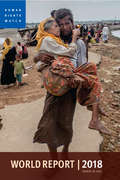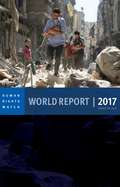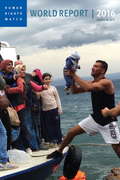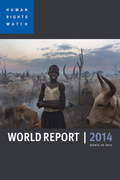Special Collections
Human Rights Collection
- Table View
- List View
Bad Dreams
by Human Rights WatchThis report is the first comprehensive examination of the variety of human rights abuses that foreign workers experience in Saudi Arabia. The voices of these migrants provide a window into a country whose hereditary, unelected rulers continue to choose secrecy over transparency at the expense of justice. The stories in this report illustrate why so many migrant workers, including Muslims, return to their home countries deeply aggrieved by the lack of equality and due process of law in the kingdom. In an important sense, this report is an indictment of unscrupulous private employers and sponsors as well as Saudi authorities, including interior ministry interrogators and shari'a court judges, who operate without respect for the rule of law and the inherent dignity of all men and women, irrespective of gender, race, and religion.
After the Deluge
by Human Rights WatchIn a 47-page report released today, After the Deluge: India's Reconstruction Following the 2004 Tsunami, Human Rights Watch examines the Indian government's response to the tsunami and documents several systemic and potentially enduring failures. Human Rights Watch applauded the Indian government's overall response to the tsunami, but found that government recovery efforts did not adequately take into account the needs of different vulnerable segments of the affected population, particularly women, children, the disabled, Dalits (so-called untouchables) and tribal groups. In India, particularly in the weeks right after the tsunami, Human Rights Watch documented discrimination against Dalits by other victims of the tsunami, who belonged to a higher caste. In many instances, the Indian government failed to enforce its existing legislation and policy to protect vulnerable groups. Human Rights Watch urged the Indian government to undertake effective training and education-both for officials and the affected communities-part of its disaster management strategy.
Aceh Under Martial Law
by Human Rights WatchA shroud of secrecy has enveloped Indonesia's Aceh province since the Indonesian government renewed its war there against the armed, separatist Free Aceh Movement (Gerakan Aceh Merdeka, or GAM) on May 19, 2003. This shroud parts occasionally to provide glimpses of vulnerable civilians caught in a violent military campaign with inadequate humanitarian relief. Although information is never more important than during wartime, troubling glimpses are all that is possible right now. The Indonesian government and military have effectively barred nearly all independent and impartial observers (including diplomats), as well as international humanitarian aid workers, from the province. Those allowed into or to stay in Aceh are generally not permitted to venture beyond the provincial capital, Banda Aceh.
Aceh Under Martial Law
by Human Rights WatchA hidden war has been raging in Aceh since May 2003, when Indonesia's President Megawati Sukarnoputri declared martial law in the province. This report attempts to convey some of the reality of that war: extrajudicial executions, forced disappearances, beatings, arbitrary arrests and detentions, and drastic limits on freedom of movement. In many incidents described to Human Rights Watch, Indonesian security forces - military and police - routinely resorted to violence against primarily young Acehnese men stopped for questioning. Witnesses told Human Rights Watch about killings of civilians during village sweeps, some while being questioned or detained, others while fleeing in fear of mistreatment.
Aceh Under Martial Law
by Human Rights WatchThousands of Indonesians have fled to Malaysia since the start of military operations and martial law in Indonesia's Aceh province in May 2003. They are fleeing a brutal conflict marked by grave human rights violations, including extra-judicial executions, forced disappearances, kidnappings, beatings, arbitrary detentions, and strict limitations on freedom of movement. Young men, in particular, are singled out by Indonesian security forces on suspicion that they are separatist rebels or supporters. Ongoing fighting, massive internal displacement, drastic restrictions on movement, and restrictions on humanitarian assistance have made the province an unbearable place to live for many Acehnese. Braving a difficult, dangerous, and costly journey, many have fled to Malaysia to seek refuge. Upon arrival in Malaysia, Acehnese refugees face a new set of challenges. Malaysia does not have a system to provide protection for refugees and asylum seekers. It does not recognize Acehnese fleeing the armed conflict at home as refugees. As a result, the Malaysian government has arrested, detained, and deported Acehnese refugees back to the very conflict they are fleeing. Those who manage to avoid deportation frequently live in situations of extreme poverty and are regularly subject to extortion from local police.
Abusing the User:Police Misconduct, Harm Reduction and HIV/AIDS in Vancouver
by Human Rights WatchAn anti-drug crackdown by the Vancouver Police Department has driven injection drug users away from life-saving HIV prevention services, raising fears of a new wave of HIV transmission in the city that is already home to the worst AIDS crisis in the developed world, said Human Rights Watch. In a 25-page report released today, "Abusing the User: Police Misconduct, Harm Reduction and HIV/AIDS in Vancouver," Human Rights Watch documents instances of unnecessary force and mistreatment, arbitrary arrest, and other intimidation and harassment of drug users as part of a campaign commonly referred to as Operation Torpedo. The crackdown began on April 7 in the city's impoverished Downtown Eastside neighborhood. Though drug traffickers are the ostensible target, drug users not charged with selling drugs have been driven to places where health workers cannot reach them to ensure access to sterile syringes and other HIV prevention services.
World Report 2018
by Human Rights Watch and Kenneth RothThe human rights records of more than ninety countries and territories are put into perspective in Human Rights Watch's signature yearly report. Reflecting extensive investigative work undertaken in 2016 by Human Rights Watch staff, in close partnership with domestic human rights activists, the annual World Report is an invaluable resource for journalists, diplomats, and citizens, and is a must-read for anyone interested in the fight to protect human rights in every corner of the globe.
World Report 2017
by Human Rights Watch and Kenneth RothThe human rights records of more than ninety countries and territories are put into perspective in Human Rights Watch's signature yearly report. Reflecting extensive investigative work undertaken in 2016 by Human Rights Watch staff, in close partnership with domestic human rights activists, the annual World Report is an invaluable resource for journalists, diplomats, and citizens, and is a must-read for anyone interested in the fight to protect human rights in every corner of the globe.From the Trade Paperback edition.
World Report 2016
by Human Rights Watch and Kenneth RothThe human rights records of more than ninety countries and territories is put into perspective in Human Rights Watch's signature yearly report. Reflecting extensive investigative work undertaken in 2015 by Human RightsWatch staff, in close partnership with domestic human rights activists, the annual World Report is an invaluable resource for journalists, diplomats, and citizens, and is a must-read for anyone interested in the fight to protect human rights in every corner of the globe.From the Trade Paperback edition.
World Report 2013
by Human Rights Watch and Kenneth Roth"The reports of the New York-based Human Rights Watch have become extremely important. . . . Cogent and eminently practical, these reports have gone far beyond an account of human rights abuses. . . ."--Ahmed Rashid in The New York Review of Books"An attempt to bring rationality where emotion tends to dominate."--Simon Jenkins, former editor of The Times (London) In the aftermath of 2011's Arab Spring uprisings, unexpected new challenges and imperatives of building rights-respecting democracies appeared in their wake. Human Rights Watch's 23rd annual World Report explores these new challenges and summarizes human rights conditions and practices in more than 90 countries and territories worldwide, reflecting extensive investigative work by Human Rights Watch staff. Human Rights Watch's World Report 2013 is the global rights watchdog's flagship annual review of global trends and news in human rights. An invaluable resource for journalists, diplomats, and citizens, it features not only incisive country surveys but also several hard-hitting essays highlighting key human rights issues, including:*An introduction by Human Rights Watch Executive Director Ken Roth on how the Arab Spring shows us that toppling dictators may yet prove to be easier than the tough, complicated process of building a rights-respecting democracy;*An essay on a Human Rights Council resolution on "traditional values" sponsored by Russia, and the implicit dangers this could mean for LGBT rights; *An essay on the failure of many global businesses to operate with sufficient regard to human rights, and of governments to oversee them--leading to abuses such as the use of forced labor on a Canadian construction site in Eritrea, or the gang rapes of women by security guards employed by an international mining giant in Papua New Guinea.World Report 2013 also features striking photo essays by award winning photographers.
Ill-Equipped
by Human Rights Watch StaffMentally ill offenders face mistreatment and neglect in many U.S. prisons. One in six U.S. prisoners is mentally ill. Many of them suffer from serious illnesses such as schizophrenia, bipolar disorder, and major depression. There are three times as many men and women with mental illness in U.S. prisons as in mental health hospitals. The rate of mental illness in the prison population is three times higher than in the general population. This 215-page report examines how prisons are dangerous and damaging places for mentally ill people. Other prisoners victimize and exploit them. Prison staff often punish mentally ill offenders for symptoms of their illness - such as being noisy or refusing orders, or even self-mutilation and attempted suicide. Mentally ill prisoners are more likely than others to end up housed in especially harsh conditions, such as isolation, that can push them over the edge into acute psychosis. Woefully deficient mental health services in many prisons leave prisoners undertreated - or not treated at all. Across the country, prisoners cannot get appropriate care because of a shortage of qualified staff, lack of facilities, and prison rules that interfere with treatment. The report is based on more than two years of research and hundreds of interviews with prisoners, corrections officials, mental health experts and attorneys and makes recommendations on services and regulations that would assist and protect mentally ill prisoners.




